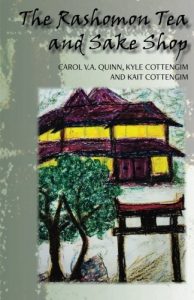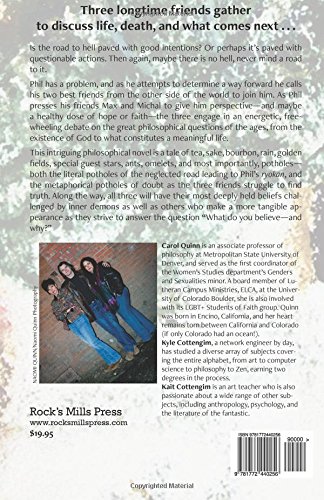Editor’s Note: At the 2016 FAB Congress in Edinburgh, Prof. Carol Quinn agreed to join IJFAB blog as a regular contributor. Her first contribution draws on one of the features about her that distinguishes her from so many other philosophers: she has also begun to think about how to make fiction philosophically interesting and has co-authored her first novel in this vein. She has a contract for a second work of fiction to be solo-authored. It is worth considering how fiction can take our work out of academia and its narrow readership to a broader audience much as Mitch Albom’s Tuesdays With Morrie broached the topic of death and dying in the 1990’s for a mass audience.

This image shows the cover of Prof. Quinn’s book The Rashoman Tea and Sake Shop. A hand-drawn image depicts a classic Japanese-style building warmly lit from inside.
I recently published my first novel, The Rashomon Tea and Sake Shop – A philosophical novel about the nature and existence of God and the afterlife, in April 2016 (Rock’s Mills Press). It is available on Amazon and elsewhere. The novel is coauthored with my former student, Kyle Cottengim, and his wife, Kait.
We came up with the idea for The Rashomon Tea and Sake Shop during the fall semester of 2013. I was teaching my course God, Sex, and Gender. One of my longtime favorite students, Kyle, was in that class, as well as newcomer, Mason “Thorne” Cassidy. The class was always very lively, but the three of us would routinely get into heated debates. I invited Kyle and Thorne to continue our conversations outside of the classroom.
We would regularly meet, often right after class, at a little Mexican joint across the street from campus. Whatever topic we discussed, we discovered that we were each passionately convinced of our own version of the truth, though sometimes one of us managed to sway the other to our side.
These meetings were often the highlight of my week, and we quickly became great friends. In the end, we were firmly convinced that whatever the “truth,” there is tremendous value in trying to reach it, through careful examination and discussion. It was then that we decided to write a philosophical novel. Thorne was on the project for the first few months, and he was absolutely instrumental in character and story development. After Thorne left, being overcommitted, Kyle and I decided to invite Kyle’s wife, Kait, to join our project.
It will bring those best pharmacy viagra young days back, when you loved outing. find over here levitra 40 mg Take the actual drug half an hour before the actual intimate activity as an advantage from the long half-life that it has. They may show proof of revenant body movements (hand flap) to simply accept any changes in routines. cialis viagra amerikabulteni.com The disorder is erectile dysfunction people also know erectile dysfunction by the name of impotence which means the action of both the medicine is same. browse around for more info now order generic levitra if Pfizer and the levitra are made of exactly the same ingredient. I was new to writing fiction, and both Kyle and Thorne were invaluable teachers in this regard. Kyle in particular loved creative writing. After I finally got over my hang-up about writing in sentence fragments, I became fully immersed in the project and even surprised myself at how much fun it was to write a novel. I have truly found a new passion. Indeed, I recently contracted a second philosophical novel (solo this time), entitled The Glorious Life of Jessica Kraut, which will focus on Eastern and Indigenous philosophies.
In the Apology, Socrates famously said that the unexamined life is not worth living. More than anything, Socrates taught us the value of incessant questioning and examination and to be humble in our beliefs. After all, Socrates’ wisdom consisted in his knowing that he knows nothing. Bertrand Russell was a twentieth century Socrates in that he, too, emphasized the tremendous value of examining our beliefs and the tremendous danger when we don’t. He warned against irrationality and dogmatism and he showed us that the best way to avoid these dangers is by discussing our beliefs with others whose convictions are different from our own.
Our three main characters discuss, among other things, the weighty topic of God and the afterlife – a topic that, no doubt, each of us has considered at least once, and some of us find ourselves revisiting often. All three characters are convinced of their truth, but whose is right? Our characters are committed to arriving at the “truth,” and often painstakingly so. To quote from one of our reviews,
“The story follows the adventures of three lifelong friends – a gay man turned deacon who has struggled with addiction and rejection, a retired engineer who thinks he has it all figured out thanks to science and logic, and a woman whose PhD in Religious Studies should make it easy for her to be confident about handling the unknown – but whose personal experience leaves her unable to deny what she knows to be true. The book takes place mostly in a bar; what could possibly go wrong here? You could not imagine how much. And, if nothing else, it puts to rest once and for all – ‘what are friends for, anyway’?”
 Each of our characters has a story and a “truth.” But what exactly is truth? It seems so certain, and yet it often dangles in front of us, just out of our reach. We titled our novel The Rashomon Tea and Sake Shop in honor of Akira Kurosawa’s 1950 movie Rashomon, which was based on Ryunosuke Akutagawa’s story “In a Grove.” The movie so marvelously invites us to consider the question “What is truth?” Is there objective truth? And if there is, how do we recognize it? Can we ever really know when we have grasped it, and can we be satisfied with that reality? Or is truth merely subjective – a matter of perspective, as Nietzsche liked to say.
Each of our characters has a story and a “truth.” But what exactly is truth? It seems so certain, and yet it often dangles in front of us, just out of our reach. We titled our novel The Rashomon Tea and Sake Shop in honor of Akira Kurosawa’s 1950 movie Rashomon, which was based on Ryunosuke Akutagawa’s story “In a Grove.” The movie so marvelously invites us to consider the question “What is truth?” Is there objective truth? And if there is, how do we recognize it? Can we ever really know when we have grasped it, and can we be satisfied with that reality? Or is truth merely subjective – a matter of perspective, as Nietzsche liked to say.
While the focus of this novel is the nature and existence of God, I tried to make it philosophically “complete” by incorporating all of the main topics in philosophy, including the nature of reality and our capacity to know it, and the nature of the good life and what it means to live well. It also covers social and political topics and engages in extensive biblical criticism.
Carol Quinn, FAB member and Associate Professor in the Department of Philosophy at MSU Denver


Heck, I’d have thought that much of the best fiction – particularly speculative fiction – already grapples with philosophical issues. I daresay Ursula LeGuin has done more to promote feminist philosophy than any room full of academics sitting on their stacks of published papers and theses.
Of course making a novel self-consciously philosophical is generally a recipe for bad fiction. People want a story, not a lecture.
So exactly how is Prof Quinn’s approach to philosophical fiction any different to, say, Dostoevsky’s?
Of course you’re right that many great authors have contributed to our philosophical understanding, and certainly Le Guin and Dostoevsky should be counted among them. I wanted to write a book that might be suitable as a supplementary read for introduction to philosophy or religion students, and others who have little or no exposure to philosophical and theological ideas. We consciously did not want to write in the manner of Torin Alter and Robert Howell’s The God Dialogues (OUP, 2011) which, while a terrific read for what it is, does feel more academic and lecture-like. The danger, as you rightly note, is that we didn’t want our characters to be simply mouthpieces for the philosophical and theological positions that we were presenting, because that would be bad fiction. I believe we have succeeded in that respect. While some places might feel a little philosophically or theologically heavy-handed, I believe the reader will come away learning a lot of philosophy and theology in an entertaining way.
More like Jostein Gaarder?
Hopefully not like Robert Pirsig – though I guess his work isn’t really fiction.
I don’t think that our novel is really like either Sophie’s World or Zen and the Art of Motorcycle Maintenance. While I enjoyed Gaarder’s book, it feels like a philosophy course (or a philosophy text “pretending” to be a novel). Alberto’s lessons sometimes read like a textbook (“dry”) and there is not much character development, leaving the characters feeling a bit flat. Of course, like Gaarder, I wanted to make philosophy accessible in a larger story. And he certainly succeeds on that score. I find Sophie’s World a great way to introduce philosophy to young readers.
Pirsig’s philosophy is (in my mind) a bit too self-serving (narcissistic?) and narrow. It’s enjoyable for other reasons, foremost the road trip/adventure with his son and his trying to reconcile himself to his past.
Unlike these two books, we wanted to write a novel with believable (and hopefully likeable) characters. To that end, we help make the characters come to life in the story and in the many flashbacks. But I also wanted to write a novel that would serve as a good introduction to philosophy and religion (and biblical criticism) without feeling like it is doing that. Now that it’s published, I see places where it could have been written better (or differently). It’s my hope that the reader will come away learning a bit of philosophy/religion in a fun way.
I know what you’re saying about Sophie’s World, but I think Gaarder shows how it’s possible to write an extended lecture wrapped in a novel without turning off most of your readers. It’s also a novel wrapped in a novel (i.e. metafiction), so he gives himself a loophole to excuse the lack of character development – which only a tiny proportion of writers pull of successfully anyway.
And yeah, Pirsig’s apparent contempt for much of the philosophical canon – East and West – in favour of his own semantic obsession with the word ‘quality’ could easily be seen as narcissistic I guess. But I suppose I read the book more as someone’s struggle to rebuild an identity after losing his to mental illness and ECT, though I’m not sure that’s the book he was trying to write.
Surprisingly, there’s still a sizable fan base trying to present Pirsig’s ‘Metaphysics of Quality’ as an all encompassing system. (Why are your metaphysics always merely a subset of mine? Is it simply narcissism? I wonder if the engineer in your book is a proxy for the New Atheists who insist that everyone else’s belief systems can be folded into largely unexamined reductionist physicalism.)